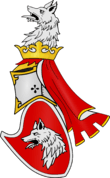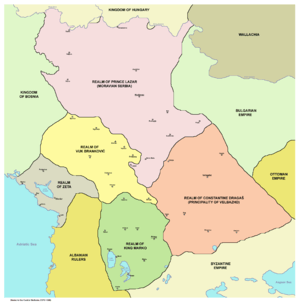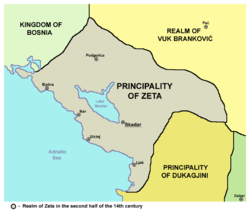Balšić noble family
| Balšić Балшићи | |
|---|---|
 | |
| Country |
|
| Estates |
(southern Montenegro, northern Albania)
|
| Titles |
gospodar (lord) autokrator (self-ruler) |
| Founded | before 1355, by Balša I |
| Final ruler | Balša III (1403–1421) |
| Dissolution | 1421 (possessions passed to Despot Stephen) |
The Balsha (Serbian Cyrillic: Балшић, pl. Балшићи/Balšići; Latin: Balsich ; Albanian: Balsha) was a noble family that ruled "Zeta and the coastlands" (southern Montenegro and northern Albania), from 1362 to 1421, during and after the fall of the Serbian Empire. Balsha, the founder, was a petty nobleman who held only one village during the rule of Emperor Dušan the Mighty (r. 1331-1355), and only after the death of the emperor, his three sons gained power in Lower Zeta after acquiring the lands of gospodin Žarko (fl. 1336-1360) under unclear circumstances, and they then expanded into Upper Zeta by murdering voivode and čelnik Đuraš Ilijić (r. 1326-1362†). Nevertheless, they were acknowledged as oblastni gospodari of Zeta in edicts of Emperor Uroš the Weak (r. 1355-1371). The family is known to have seized control through trickery, such as against the Dukagjini family, and many people were deported or murdered. After the death of Uroš (1371), the family feuded with the Mrnjavčevići, who controlled Macedonia. In 1421, Balša III, on his death, passed the rule of Zeta to his uncle, Despot Stephen "the Tall"' Lazarević.
History
Origin
The Balšić family was first mentioned in a charter of Emperor Stephen Uroš V of Serbia, dated 29 September 1360. Due to sources having nothing reliable to say about their ancestors, there has been speculation on their origin, which some deem unknown.[1][2][3] Apart from Mavro Orbini's tale, there are really no other accounts on their origin.[4] In oral tradition, they descended via Grand Prince Vukan Nemanjić.[5] There exist fragmental assertions that they descended from "Emperor Nemanja".[4] The oldest mention of a Balšić is from 1304, when Serbian Queen Helen of Anjou sent a letter in Slavic through her trustee Matija Balšić from Bar (Mata de Balsich de Antibaro) to Ragusa.[6] A theory is that this Balšić married a female member of the Nemanjić royal family, and thus established the noble family of Balšić.[7] There has been various opinions about the family's origin.[8]
Karl Hopf (1832-1873) considered "unquestionably part of the Serb tribe".[9] Ivan Stepanovich Yastrebov (1839–1894), Russian Consul in Shkodër and Prizren, when speaking of the Balšići, connected their name to the Roman town of Balletium (Baleč) located near modern Shkodër.[10] According to Čedomilj Mijatović (1842–1934), the Balšić family had ultimate origin in the House of Baux from Provence (southeastern France); from that family sprung an Italian family (del Balzo), and from them the Balšići, and from them a Romanian family.[11] Serbian historian Vladimir Ćorović (1885-1941) concluded, based on their name, that they had Roman (Vlach) origin.[12] Croatian ethnologist Milan Šufflay (1879–1931) mentioned them as of "Romanian and Vlach origin".[9] Croatian linguist Petar Skok considered them to have been of Vlach origin, and Serbian historian Milena Gecić supported his theory.[11] Giuseppe Gelcich theorized on the origin in his La Zedda e la dinastia dei Balšidi: studi storici documentati (1899). The theory asserting them as descendants of the Frankish nobleman Bertrand III of Baux, a companion of Charles d'Anjou is regarded as highly improbable.[13] German linguist Gustav Weigand (1860–1930) alleged a mixed Albanian-Aromanian origin after he noted that the family name was included in a list of early Albanian surnames in Romania.[13]
In modern scholarship John Fine,[14] Donald Nicol,[15] Peter Bartl[16] view the origin of the Balšić family as Serbian, while Robert Elsie mentions them as of "probably Slavic origin".[17] Noel Malcolm suggests a dual Serbo-Albanian identity.[13]
Early history
According to Mavro Orbini (writing in 1601), Balša, the eponymous founder, was a petty nobleman that held only one village in the area of Lake Skadar during the rule of Emperor Dušan the Mighty (r. 1331-1355). Only after the death of the emperor, Balša and his three sons gained power in Lower Zeta after acquiring the lands of gospodin Žarko (fl. 1336-1360) and by murdering voivode and čelnik Đuraš Ilijić (r. 1326-1362†), the holders of Lower and Upper Zeta, respectively.[18] Balša dies the same year, and his sons, the Balšić brothers, continue in ruling the province spanning Podgorica, Budva, Bar and Skadar.[18]
The Balšići managed to elevate themselves from petty nobility to provincial lords.[19]
Heads


Zeta [Zoomed].
- Balša (I) (fl. 1360–62)
- Đurađ I (1362–1378), [Lord of] Skadar (Shkodër)
- Balša II (1378–1385), [Lord of] Skadar and Drač (Durrës)
- Đurađ II (1385–1403), [Lord of] Skadar, Budva, Podgorica, Drač, Drivast and Lješ (Lezhë), Autokrat of Zeta and the coastlands
- Balša III (1403–1421), [Lord of] Bar
Family tree
Simplified family tree:
- Balša (I) (fl. 1360–62)
- Stracimir
- Đurađ I, married Olivera Mrnjavčević (1st) and Teodora Dejanović (2nd)
- Jelisaveta or Jelisanta (d. 1443), Olivera's daughter
- Gojslava or Goisava (d. 1398), married Radič Sanković, lord of Nevesinje, Popovo Polje and Konavli
- Jevdokija, married Esau de' Buondelmonti, the ruler of Epirus (1385–1411)
- Giorgio de' Buondelmonti, ruler of Epirus 1411
- Konstantin, married Helena Thopia
- Stefan Balšić "Maramonte" (fl. 1419–40), pretender to Zeta
- Jelena
- Đurađ (illegitimate)
- Balša II
- Ruđina
- Vojislava, married Karl Topia, the "Prince of Albania", with whom she had one son, Gjergj Thopia, Duke of Durazzo, and two daughters, Elena Thopia, Lady of Krujë, married Konstantin Balšić, and Vojislava
References
- ↑ Rudić 2006, p. 99: "О њиховом пореклу не знамо ништа" ,, "Према Чедомиљу Мијатовићу Балшићи су пореклом били француска, односно провансалска породица. Од њих су настали италијански Балшићи, од којих потичу српски Балшићи, а од њих румунски. Ч. Мијатовић, Балшићи, генеалошка студија, 150"
- ↑ Veselinović-Ljušić 2008, p. 91: "Пошто нам извори ништа поуздано не говоре о њиховим прецима, порекло ове породице је загонетно. Оно што је сигурно, то је да је име њиховог родоначелника несловенског порекла, па је то био повод историчарима да претке ..."
- ↑ Vladimir Nikolic-Zemunski (1927). Istorija cara Stevana Dušana. Narodna prosveta. p. 238.
- 1 2 Fajfric, 44. Oblasni gospodari: "O njihovom poreklu se zna veoma malo, tako da osim navoda koje je ostavio Mavro Orbin drugih podataka skoro i da nema. Postoje neki fragmentarni navodi koji ukazuju da je rodonačelnik ove porodice, Balša, zapravo rod od "cara Nemanje" te da je držao oblast Bojane (u susedstvu Skadra), no to je sve veoma nesigurno."
- ↑ Gleichen, Lord Edward (1923), Yugoslavia, Hodder and Stoughton, limited, p. 108
- ↑ Српско учено друштво 1886, p. 151, "Најстарија листина у којој има помен о једном Балши на српском земљишту од године је 1304 ("). 2. Није без значаја да се он ... „Regina misit unam suam literan slavonicam per Mata de Balsich de Antibaro". Monumenta Serbica, GT.".
- ↑ Српско учено друштво 1886, p. 210, "1266 и 1300 године, на двор краљице Јелене, родом Францускиње, рођаке анжујској династији на престолу напуљском; 2. Тај Балшић, или његов син, оженио се једном од кћери краљевског дома Немањића, те тако основао дом ....
- ↑ Soulis 1984, p. 254, "Various opinions have been expressed concerning the national origin of the Balšići family".
- 1 2 Slijepčević 1974, p. 43: "Према Карлу Хопфу и Балшићи и Црнојевићи »припадају без спора српскоме племену».34) Милан Шуфлај вели: »Балшићи су румунскога и влашкога подријетла;"
- ↑ Akademia e Shkencave e RPS të Shqipërisë 1985, p. 323: "Whereas JS Jastrebov, when speaking of the Balshaj of Shkodra calls then Balesium, Balezza, Balezum, Balezo and adds that the Greeks in Dukel74 called them Barizi."
- 1 2 Rudić 2006, p. 99.
- ↑ Ćorović 2001, ТРЕЋИ ПЕРИОД, IX. Распад Српске Царевине
- 1 2 3 Malcolm, Noel (1998). Kosovo: a short history. Macmillan. pp. 62, 368. ISBN 978-0-333-66612-8. Retrieved 5 May 2012.
- ↑ Fine 2006, pp. 292, 389.
- ↑ Nicol 2010, p. 173.
- ↑ Bartl, Peter (2001) [1995], Albanci : od srednjeg veka do danas (in Serbian), translated by Ljubinka Milenković, Belgrade: Clio, p. 31, ISBN 9788671020176, OCLC 51036121, retrieved 1 February 2012,
Род Балшића (Балша) био је српског порекла.
- ↑ Elsie, Robert (2012), A biographical dictionary of Albanian history, London: I.B. Tauris, p. 27, ISBN 9781780764313, OCLC 801605743
- 1 2 Fajfrić, ch. 44, Oblasni gospodari: "Balša o kojem ćemo sada govoriti beše veoma siromašan zetski vlastelin i za života cara Stefana držao je samo jedno selo. Ali kad je umro car, a kako njegov sin Uroš nije bio valjan vladar, počeo je s nekoliko svojih prijatelja i sa svojim sinovima Stracimirom, Đurđem i Balšom da zauzima Donju Zetu." "Posle toga krenuo je sa svojim ljudima na osvajanje Gornje Zete, koju je držao Đuraš Ilijić i njegovi rođaci. Đuraša ubiše Balšini sinovi, neke njegove rođake zarobiše, a ostali napustiše zemlju. I tako su Balšini sinovi zagospodarili i Gornjom Zetom" "Isto tako pali su u njihove ruke Dukađini koji su imali mnogo poseda u Zeti. Neke su poubijali, a druge bacili u tamnicu. Pri osvajanju ovih i drugih pokrajina više su se služili lukavstvom i prevarama nego silom oružja"
- ↑ Recueil de travaux de l'Institut des études byzantines: Volume 21 1982, "За разлику од Лазаревића, Бранковића и Драгаша, ближих или даљих рођака Немањића и потомака најугледцијих властеоских породица, први Балшићи су прави скоројевићи који су из редова ситне властеле доспели ..."
Sources
- Books
- Akademia e Shkencave e RPS të Shqipërisë (1985). The Albanians and their territories. "8 Nëntori" Pub. House. Retrieved 22 January 2012.
- Fajfrić, Željko (2000) [1998], Sveta loza Stefana Nemanje, Belgrade: Tehnologije, izdavastvo, agencija Janus
- Fine, John Van Antwerp (1994). The Late Medieval Balkans: A Critical Survey from the Late Twelfth Century to the Ottoman Conquest. Michigan: The University of Michigan Press. ISBN 0-472-08260-4.
- Jovanović, J. (1947), Stvaranje Crnogorske Države i Razvoj Crnogorske Nacionalnosti, Cetinje, pp. 18, 28, 36, 43, and 54–55
- Malcolm, Noel (1998). Kosovo: a short history. Macmillan. ISBN 978-0-333-66612-8. Retrieved 5 May 2012.
- Nicol, Donald MacGillivray (2010), The Despotate of Epiros 1267–1479: A Contribution to the History of Greece in the Middle Ages, Cambridge University Press, ISBN 978-0-521-13089-9
- Rudić, Srđan (2006), Vlastela Ilirskog grbovnika, Istorijski institut
- Soulis, George Christos (1984). The Serbs and Byzantium during the reign of Tsar Stephen Dušan (1331-1355) and his successors. Dumbarton Oaks Library and Collection. ISBN 978-0-88402-137-7. Retrieved 5 May 2012.
- Veselinović, Andrija & Ljušić, Radoš (2008). "Балшићи" Srpske dinastije. Službene glasink. Retrieved 7 May 2012.
- Journals
- Српско учено друштво (1886). Гласник Српскога ученог друштва. 65-66.
External links
| Wikimedia Commons has media related to Balšić noble family. |